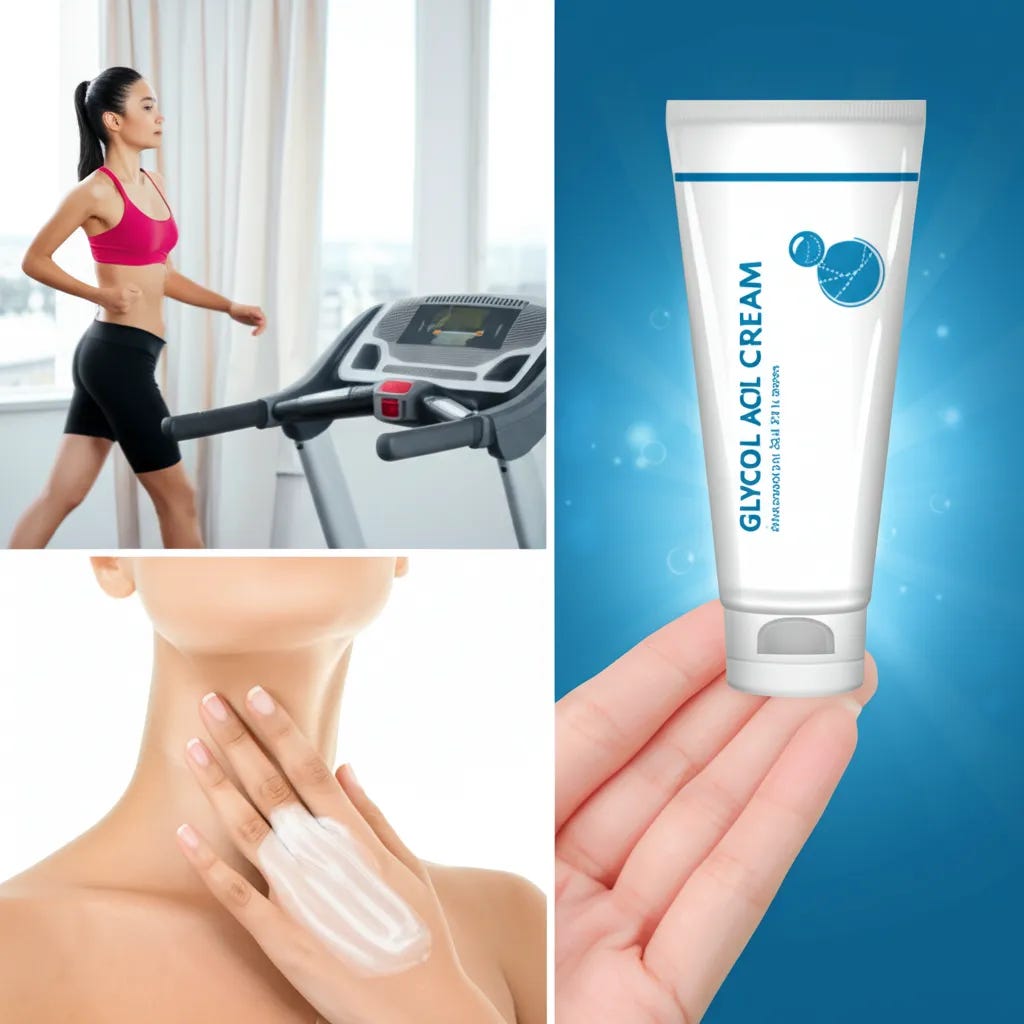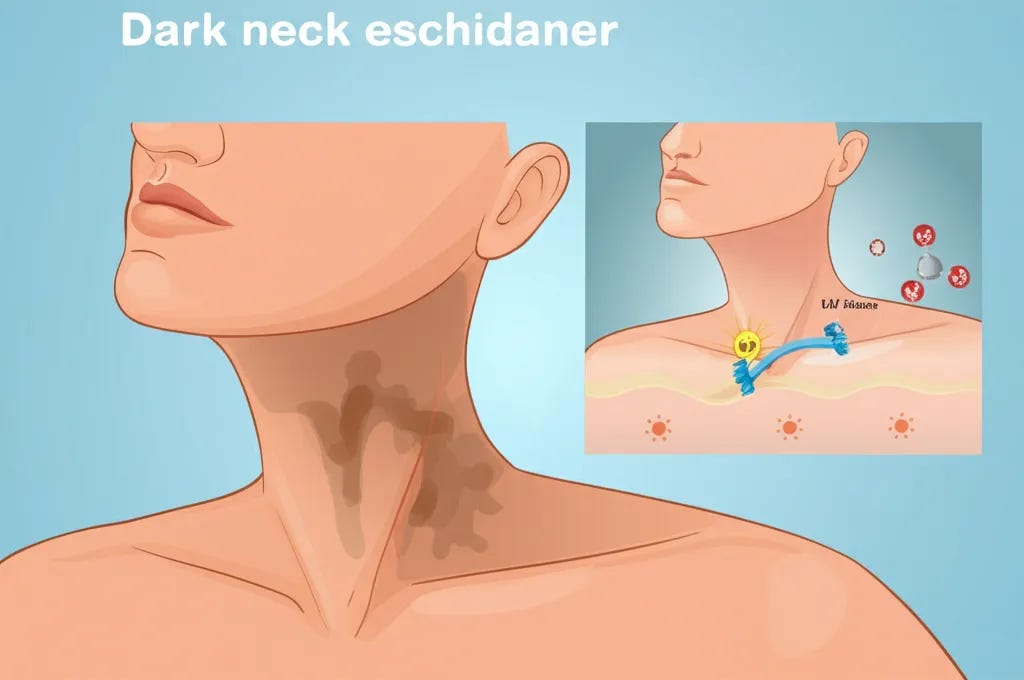Dark Neck Treatments: Myths & What Actually Works
Debunking common dark neck treatment myths! Learn what doesn't work & discover effective solutions for discoloration & hyperpigmentation. Get your healthy glow back!
What Doesn't Work: Debunking Common Myths
Many individuals turn to quick fixes for dark neck discoloration, but some common approaches are ineffective and potentially harmful. It's important to understand which methods to avoid to prevent further skin damage and achieve sustainable results.
Scrubbing: An Aggressive Approach
Scrubbing the affected area aggressively might seem like a logical solution to remove darkened skin cells. However, this approach is often counterproductive. Vigorous scrubbing can irritate the skin, leading to inflammation and potentially worsening hyperpigmentation. The skin's natural reaction to irritation is to produce more melanin, the pigment responsible for skin color, leading to a darker appearance over time. Gentle exfoliation, if any, is key.
De-Tan Creams: A Temporary Fix with Risks
De-tan creams promise a quick solution to uneven skin tone. Many of these creams contain harsh chemicals that can lighten the skin temporarily. However, this lightening is often superficial and short-lived. Furthermore, prolonged use of de-tan creams can lead to skin sensitivity, irritation, and even chemical burns. The ingredients in these creams may also disrupt the skin's natural balance, leading to further discoloration in the long run.
Home Remedies: Beware of Misinformation
While some home remedies may offer mild benefits, others are potentially damaging. Using lemon juice, for example, is a popular DIY approach for lightening skin. However, lemon juice contains citric acid, which can be highly irritating and cause photosensitivity, making the skin more susceptible to sun damage. Similarly, applying baking soda can disrupt the skin's pH balance, leading to dryness and irritation. It's essential to research and verify the safety and effectiveness of any home remedy before applying it to your skin.
---
Effective Strategies for Tackling Dark Neck
While quick fixes should be avoided, several effective strategies can help manage and reduce dark neck discoloration. These strategies focus on addressing the underlying causes, promoting healthy skin, and protecting the skin from further damage.
Weight Loss and Insulin Resistance
Acanthosis nigricans, a condition often associated with dark neck discoloration, is frequently linked to insulin resistance and obesity. Losing weight and improving insulin sensitivity can significantly reduce the severity of this condition. Lifestyle changes such as adopting a healthy diet, engaging in regular exercise, and managing blood sugar levels are crucial for addressing the root cause of the problem. Consulting with a healthcare professional or nutritionist can provide personalized guidance and support in achieving these goals.
Glycolic Acid Cream: Gentle Exfoliation
Glycolic acid is an alpha-hydroxy acid (AHA) that gently exfoliates the skin, removing dead skin cells and promoting cell turnover. Applying a glycolic acid cream (at a low concentration, around 5-10%) a few times a week can help lighten dark neck discoloration over time. It's important to start with a lower concentration and gradually increase it as your skin tolerates it. Always follow up with a moisturizer and sunscreen, as glycolic acid can make the skin more sensitive to the sun.
Moisturizing: Essential for Skin Health
Keeping the skin well-hydrated is crucial for maintaining its health and resilience. Dry skin is more prone to irritation and inflammation, which can worsen hyperpigmentation. Applying a gentle, fragrance-free moisturizer twice a day can help maintain the skin's moisture barrier, prevent dryness, and promote an even skin tone. Look for moisturizers that contain ingredients like hyaluronic acid, ceramides, or glycerin, which are known for their hydrating properties.
---
The Role of Professional Treatments
When over-the-counter treatments are not sufficient, professional dermatological procedures can offer more targeted solutions for dark neck discoloration. These treatments involve the expertise of a dermatologist who can assess your skin type, identify the underlying cause of hyperpigmentation, and recommend the most appropriate course of action.
Chemical Peels: Deeper Exfoliation
Chemical peels involve applying a chemical solution to the skin to exfoliate the outer layers and promote new skin growth. Stronger peels can penetrate deeper into the skin, effectively reducing hyperpigmentation. Dermatologists use various types of peels, such as glycolic acid peels, salicylic acid peels, or trichloroacetic acid (TCA) peels, depending on the severity of the discoloration and the patient's skin type. While chemical peels can deliver noticeable results, they also carry risks such as redness, peeling, and potential scarring. Therefore, it's crucial to have them performed by a qualified dermatologist.
Laser Therapy: Targeted Pigment Removal
Laser therapy uses concentrated light beams to target and break down pigment cells in the skin. Different types of lasers are available, each designed to address specific skin concerns. Laser treatments can be effective for reducing hyperpigmentation, but they are generally more expensive and require multiple sessions. Like chemical peels, laser therapy carries risks such as blistering, scarring, and changes in skin pigmentation. Choosing an experienced dermatologist who can assess your skin and select the appropriate laser is essential for minimizing these risks.
---
Prevention is Key: Protecting Your Neck
Preventing dark neck discoloration is just as important as treating it. Protecting your skin from the sun, avoiding skin irritation, and managing underlying health conditions can significantly reduce your risk of developing or worsening hyperpigmentation.
Sun Protection: A Non-Negotiable Step
Sun exposure is a major culprit behind dark neck discoloration. Ultraviolet (UV) radiation stimulates melanin production, leading to darkening of the skin. Applying a broad-spectrum sunscreen with an SPF of 30 or higher to your neck every day, even on cloudy days, is essential for preventing sun damage. Reapply sunscreen every two hours, especially if you are sweating or swimming. Wearing protective clothing, such as a high-necked shirt or a scarf, can also provide additional sun protection.
Avoiding Irritation: Gentle Skincare
Using harsh soaps, fragrances, and skincare products can irritate the skin and trigger inflammation, which can worsen hyperpigmentation. Opt for gentle, fragrance-free cleansers and moisturizers. Avoid scrubbing the skin aggressively and be mindful of any products that cause redness, itching, or burning. Patch-testing new products on a small area of skin before applying them to the entire neck can help identify potential irritants.
---
Understanding the Underlying Causes
Dark neck discoloration can stem from various underlying factors. Identifying these causes is crucial for developing an effective treatment plan.
Acanthosis Nigricans: A Common Culprit
Acanthosis nigricans is a skin condition characterized by dark, velvety patches in body folds and creases, including the neck. It's often associated with insulin resistance, obesity, and hormonal disorders. Addressing these underlying health issues can help improve the appearance of the affected skin.
Post-Inflammatory Hyperpigmentation (PIH)
PIH occurs after an inflammatory skin condition, such as eczema, psoriasis, or acne. When the skin heals, it may produce excess melanin, leading to dark spots or patches. Treating the underlying inflammatory condition and protecting the skin from further irritation can help minimize PIH.
Sun Damage: A Leading Factor
Prolonged sun exposure can cause hyperpigmentation on the neck, especially in individuals with darker skin tones. UV radiation stimulates melanin production, leading to uneven skin tone. Consistent sun protection is crucial for preventing and managing sun-induced hyperpigmentation.
---
Conclusion
Treating dark neck discoloration requires a multifaceted approach that addresses both the symptoms and underlying causes. Avoid harsh scrubbing, de-tan creams, and potentially harmful home remedies. Instead, focus on strategies like weight loss, the use of glycolic acid cream, consistent moisturizing, sun protection, and gentle skincare. If over-the-counter treatments are not effective, consider consulting a dermatologist for professional treatments like chemical peels or laser therapy. By understanding the causes and implementing appropriate strategies, you can achieve a more even skin tone and improve your overall skin health.
---
Frequently Asked Questions
Q: Is dark neck discoloration a sign of a serious health problem?
A: In some cases, dark neck discoloration can be a sign of underlying health issues such as insulin resistance or hormonal disorders. While it's usually not a medical emergency, it's important to consult with a healthcare professional to rule out any underlying conditions.
Q: How long does it take to see results from dark neck treatments?
A: The timeline for seeing results from dark neck treatments varies depending on the underlying cause, the severity of the discoloration, and the chosen treatment method. Over-the-counter treatments may take several weeks or months to show noticeable improvement, while professional treatments may deliver faster results.
Q: Can I prevent dark neck discoloration?
A: Yes, you can prevent dark neck discoloration by protecting your skin from the sun, avoiding skin irritation, and managing underlying health conditions such as insulin resistance. Consistent sun protection, gentle skincare, and a healthy lifestyle are key for preventing hyperpigmentation.
Q: Are there any natural remedies that can help with dark neck discoloration?
A: Some natural remedies, such as aloe vera or turmeric, may offer mild benefits for lightening dark neck discoloration. However, their effectiveness is often limited, and it's essential to use them with caution to avoid skin irritation. Always patch-test natural remedies before applying them to the entire neck.
Q: When should I see a dermatologist about dark neck discoloration?
A: You should see a dermatologist about dark neck discoloration if over-the-counter treatments are not effective, if the discoloration is accompanied by other symptoms such as itching or inflammation, or if you suspect an underlying health condition is contributing to the problem. A dermatologist can accurately diagnose the cause of your discoloration and recommend the most appropriate treatment plan.






